- Home›
- Mates & Me›
- 25 Creative Ways To Foster Creativity In Children
25 Creative Ways To Foster Creativity In Children
By: Varsha Tue, 29 Sept 2020 7:48:19

Creativity involves the use of imagination and ideas to come up with something of value; a physical invention, piece of art or a solution to a problem. Throughout our education, life and working careers, creativity may play a significant role in development and success. Creativity can be nurtured and it is often a way of thinking rather than an innate talent. Most of the people we might describe as creative are probably individuals who have worked incredibly hard at their craft and practiced specific skills.
You might imagine creativity to include painting a picture, putting on a puppet show or making up a funny story—and it does!—but there are actually endless opportunities to ask intriguing questions and model creative thinking in the routine, day-to-day moments with your child. In fact, raising a creative child may be easier than you think. Here are 25 simple ideas to get you started:
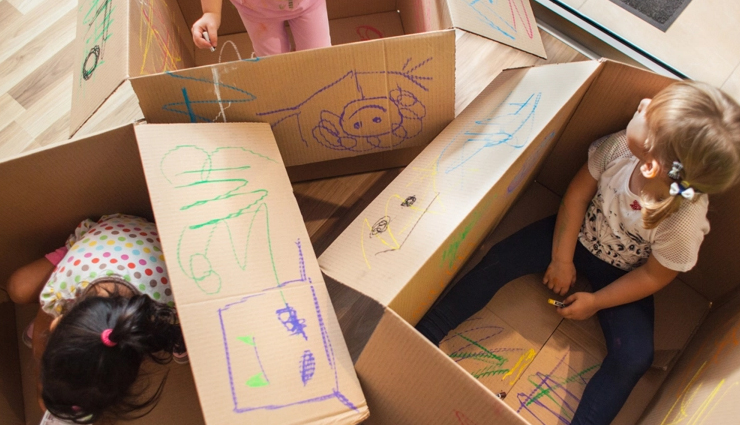
1. When your child asks for help solving a problem—whether it's something concrete like a tough homework assignment or more general like how to be a good friend—don't immediately gratify by answering. Instead, ask your child what he or she thinks, and applaud all ideas, especially ones that are unexpected and outside the box.
2. Play with your child—but focus on following their lead. Whether you're chasing dragons or flying to the moon in a cardboard box, resist the temptation to interject or guide the play, and allow yourself to be a pawn in their creative world. "This type of interaction sends the message that you support and prioritize their creative space," Dr. Wegner said.
3. Try tackling easy home repairs (painting a room, fixing a leaky faucet) yourself using online tutorials. This is a great way to model creative problem-solving skills and—should the project not go as expected and you need to call in a professional—that it's okay to ask for help when you don't have all the answers.
4. Let your kids get dirty. Send your child outside when it rains, and encourage him or her to slide in the mud, stomp in puddles, or play in the way that makes him or her feel free and happy.
5. Lend your child your tablet or smartphone, and give him or her a quick tutorial for taking, editing and saving a photo. Then, set your budding photographer loose, and encourage him or her to experiment with the camera.
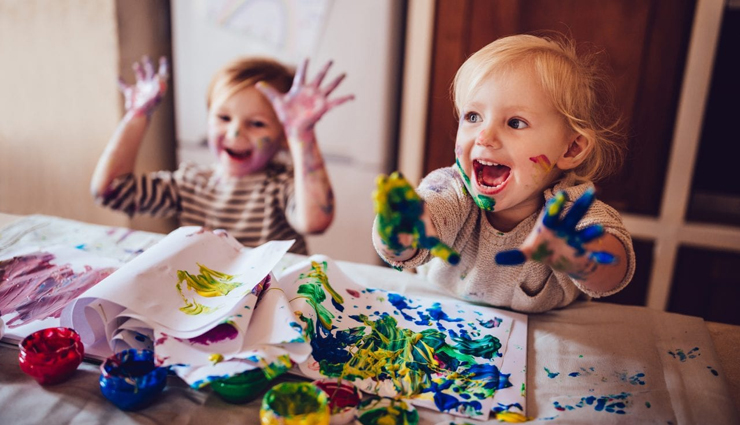
6. Ask your child to imagine what it would be like to have a superpower: "If you could be invisible for a day, what would you do?
7. The next time you plan a visit to a museum or zoo, download the attraction's official app to review with your child before and after the outing. This is a great way to extend their learning and get them thinking creatively about the experience long after it's over.
8. Bake your child's favorite cookies together, but tweak the recipe—i.e. substitute one or two of the usual ingredient like white chocolate chips instead of milk chocolate or dried cranberries instead of raisins. Who knows? You might even prefer the new version to the original!
9. Ask your child to solve a family problem—i.e. "The living room is constantly messy. What should we do about it?" According to Dr. Wegner, "This makes them feel important, creates space for their own creative problem solving, and allows opportunity for them to contribute to the family."
10. Play your child's favorite game together, but encourage him or her to come up with new rules. It will feel like a brand new game again!
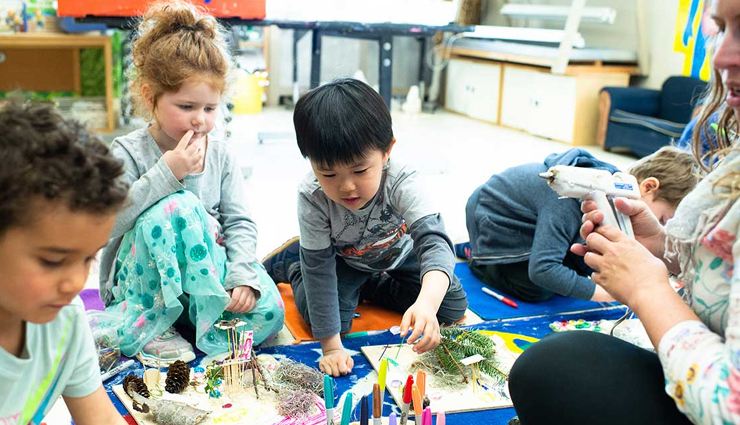
11. Here's a good open-ended question to get your child thinking creatively about other people: "If you could give one gift to every single child in the world, what gift would you give?"
12. For an easy way to experience routine activities differently: Turn on music in the morning when your child is eating breakfast and getting ready for school or at night when you're eating together. Ask him or her for specific song requests.
13. Take an alternative route home from school or the store. Don't be afraid of getting lost!
14. The next time you're grocery shopping with your child, hunt for a fruit, vegetable or other item he or she has never eaten before. Look for yummy recipes with that food on Pinterest, and cook it together for dinner.
15. Go for a walk and encourage your child to collect rocks, twigs, flowers and other items in nature. When you get back home, make up a story about the items you collected together.
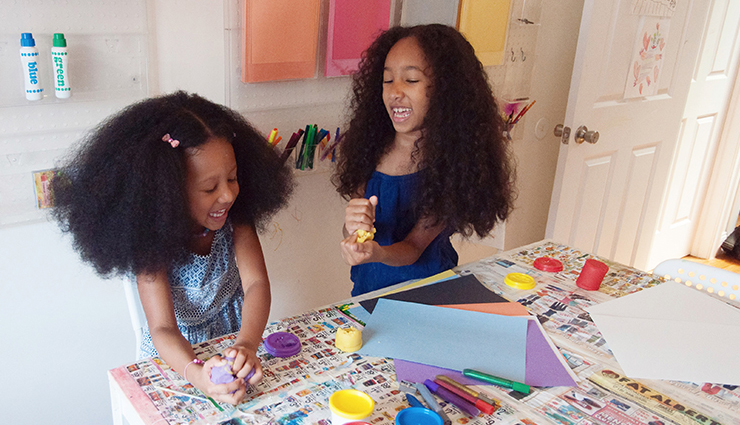
16. Extracurricular activities are great, but try to leave room in your child's schedule for unstructured activities. Some down time in the day is essential for creative play.
17. Gather some stuffed animals and a play doctor's kit, and turn your living room into a vet clinic.
18. Give your child a drawing prompt: "If you could invent something that would make life easier for people, what would you invent? What would it look like, and what would it do?"
19. Have your child choose an outfit for the day with items he or she has never worn together before. Take photos of your child wearing the "new" outfit.
20. Encourage play with open-ended toys, a.k.a. toys that can be used in a variety of ways depending on your child's mood and imagination: for example, blocks, magnetic tiles, sand, dollhouses, dress-up clothes, matchbox cars, stuffed animals, and play dough.
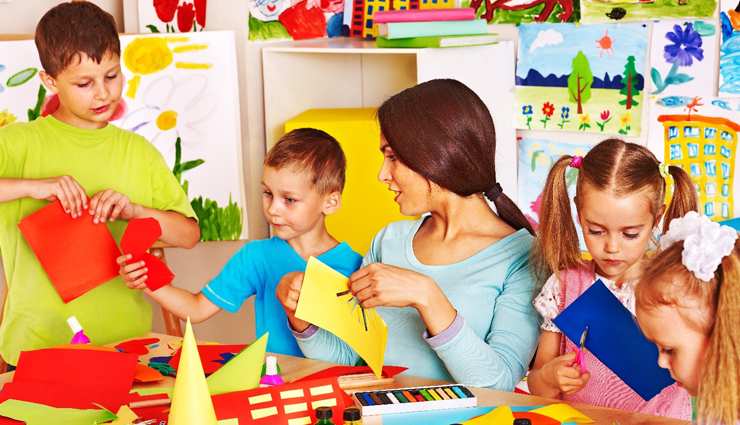
21. Always praise your child's effort—not the result. "I'm so proud of you for studying so hard for that test. I know you spent a really long time on it." Motivating children to use their minds for learning and solving problems makes a lasting impression—much more lasting than whatever mark he or she receives on a test.
22. If your child feels badly after failing at something, don't immediately tell him or her that it doesn't matter. Instead, ask questions: "Why do you think you didn't get a better score on the test?" This will give him or her a chance to think creatively about the experience so he or she can do better at the next thing.
23.Show your child how to record videos of him or herself using your mobile device. Ask him or her to interview you (like a news show) or film a music video of a favorite song.
24. The next time you order a large item that's delivered to your house, empty the cardboard box it comes in and set it in an open area of your house. Let your child decide what he or she wants it to be—a fort, a rocket ship, a castle.
25. Choose a favorite family story—for example, how you almost didn't make it to the hospital on the day your child was born or the funniest thing that happened during summer vacation. Then, have your child retell the story from another person's point-of-view—maybe, your doctor's or a sibling''s. Being able to think about a story from alternate perspectives is an important creative thinking skill.





